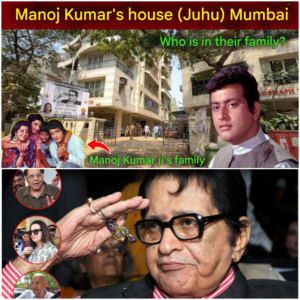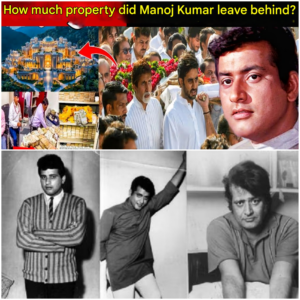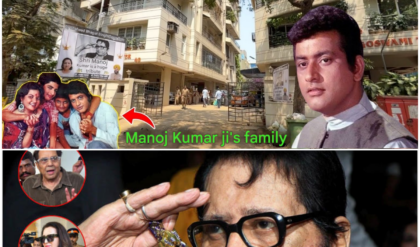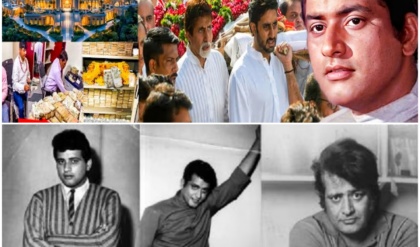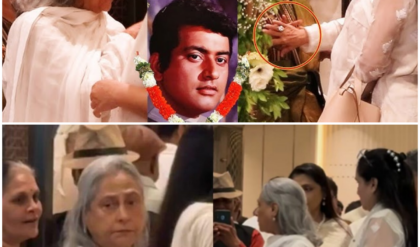Manoj Kumar left behind property worth so many crores, who will be the owner? Manoj Kumar Net Worth
.
.
.
PLAY VIDEO:
Legendary Actor Manoj Kumar Passes Away at 87 — A Life of Patriotism, Cinema, and an Enduring Legacy
April 6, 2025 | Mumbai | By Entertainment Bureau
In a deeply somber moment for Indian cinema, iconic Bollywood actor and filmmaker Manoj Kumar—widely known as “Bharat Kumar”—passed away at the age of 87. His death marks the end of an era, one that celebrated the spirit of India, patriotism, and socially conscious storytelling through cinema. As tributes pour in from across the country, the nation mourns the loss of not just an actor but a cultural voice that shaped the patriotic landscape of Indian films.
From the dusty lanes of Abbottabad (now in Pakistan) to becoming the face of India’s post-independence patriotism on celluloid, Manoj Kumar’s life journey was nothing short of cinematic. But even as the world reflects on his legacy, questions arise about the vast estate he leaves behind—and more importantly, about the spiritual and cultural inheritance he has etched into the hearts of generations.
A Quiet Morning, A National Silence
It was a peaceful April morning when the news of Manoj Kumar’s death broke. There was no sensational breaking news, no dramatic announcement—just a simple, respectful statement: “Bharat Kumar is no more.”
The silence was fitting. For a man who lived with quiet dignity and left behind thunderous cinematic messages, his departure was in the same tone of grace that defined his life.
From Harikishan Goswami to Bharat Kumar
Born on July 24, 1937, in Abbottabad, Manoj Kumar’s early years were marked by upheaval. After the Partition, his family migrated to Delhi, where he grew up in modest circumstances. Inspired by the films of Raj Kapoor and Dilip Kumar, young Harikishan dreamt of the silver screen.
He adopted the screen name “Manoj Kumar” and began his acting career in the 1950s. It wasn’t long before he became a household name. But it was his transformation into Bharat Kumar—after the success of Upkar in 1967—that turned him from an actor into a national phenomenon.
Films That Defined a Nation
Upkar, inspired by then Prime Minister Lal Bahadur Shastri’s slogan “Jai Jawan, Jai Kisan,” depicted the heroism of both the soldier and the farmer. It struck a deep chord in a newly independent India, still forming its national identity. From there, Manoj Kumar made films like Purab Aur Paschim, Roti Kapda Aur Makaan, and Kranti, each one a cinematic manifesto addressing societal issues.
He wasn’t just acting—he was leading a movement. He gave voice to farmers, laborers, and patriots. His characters weren’t rich or flamboyant—they were grounded, brave, and relatable. His dialogues resonated across the nation:
“The one who tills the land is the true son of the soil.”
“A mother doesn’t just give birth, she teaches you how to live.”
Through these lines, he built a legacy that wasn’t just about performance—it was about purpose.
A Life of Simplicity Amid Stardom
Despite his immense fame, Manoj Kumar was known for living a simple and dignified life. He never courted controversy, gossip, or the limelight. While other stars of his time basked in glamour, he preferred peace and purpose.
He married Shashi Goswami, a graceful woman who shared his quiet demeanor. Their son, Kunal Goswami, tried his hand at acting in the 1980s but could not replicate his father’s success. Nevertheless, Manoj Kumar never imposed his legacy on his son, famously saying:
“You don’t have to become Bharat. Just become a good human being—that’s the greatest role you can play.”
Manoj Kumar’s Net Worth: An Estate Built on Integrity
According to media reports, Manoj Kumar accumulated a net worth of approximately ₹50–₹70 crore during his lifetime. His most prized possession was his iconic bungalow in Juhu, Mumbai—a place often pointed out by passersby as “Bharat Kumar’s home.”
In addition to his Juhu residence, he owned several properties across Mumbai and northern India, including apartments and land parcels that have appreciated significantly over time. His estate also includes film royalties from his legendary works like Upkar, Kranti, and Roti Kapda Aur Makaan, which continue to air on television and streaming platforms.
He is also said to have had stakes in production companies that manage the intellectual property rights to his films. These sources continue to generate revenue for the family.
Who Inherits His Wealth?
As per available reports, Manoj Kumar’s estate will be inherited by his wife, Shashi Goswami, and son, Kunal Goswami. The family, known for staying away from media glare, has yet to issue a detailed statement about inheritance, but sources close to them confirm that all legal documentation is already in place.
However, many believe that Manoj Kumar’s true legacy is not his material wealth, but the emotional and cultural capital he leaves behind.
Legacy Beyond Property
When asked what Manoj Kumar’s greatest asset was, critics and fans agree—it wasn’t the real estate or the crores in the bank. It was the ideals he immortalized through his cinema.
He gave India a cinematic identity steeped in values, sacrifice, and pride. At a time when commercial cinema focused on romance and fantasy, he dared to address unemployment, cultural erosion, and poverty. He made patriotism fashionable and emotional without being jingoistic.
His films didn’t end when the credits rolled—they stayed in the audience’s conscience.
The Day the Nation Wept
When news of his death became public, it wasn’t met with sensationalism but with a wave of heartfelt sorrow. A retired schoolteacher tweeted:
“I showed Upkar to my children before teaching them about the flag.”
Another wrote:
“Manoj Kumar taught me what it meant to be Indian—more than any textbook ever did.”
His final rites were conducted with the same simplicity he lived by. There were no celebrity-packed processions or blaring sirens—just a few close friends, family, and longtime admirers quietly shedding tears and whispering prayers.
Will There Be Another Bharat Kumar?
In an age of high-budget sets, designer costumes, and box office battles, one wonders: will India ever see another Manoj Kumar?
Today’s cinema often prioritizes spectacle over soul, marketing over meaning. But there was a time when people entered theaters not just for entertainment, but for inspiration. That time belonged to Manoj Kumar.
Perhaps that’s why, despite the lavish lifestyles of modern stars, none can claim the depth of emotional connection that Manoj Kumar had with his audience. He wasn’t just a star—he was a mirror reflecting India’s hopes, pains, and dreams.
Final Reflections: When a Star Becomes a Symbol
As India bids farewell to one of its finest cinematic voices, a singular truth becomes clear—Manoj Kumar was more than an actor. He was a symbol, an idea, a moral compass for a country in search of identity. His passing may mark the end of his life, but not the end of his message.
He will live on in every scene that speaks of sacrifice, in every line that stirs patriotic pride, and in every mother who tells her child:
“Before dying for the nation, learn to live for it.”
That was the message of Manoj Kumar. And it will echo for generations.
Bharat Kumar lives on.
News
How was Manoj Kumar able to keep this secret hidden for 60 years? Manoj Kumar Secret Love Story
How was Manoj Kumar able to keep this secret hidden for 60 years? Manoj Kumar Secret Love Story . . . play video: How Manoj Kumar Kept His Secret Love Hidden for 60 Years In the golden era of Indian…
Fans were in tears when they found out what happened to Avirbhav? Superstar Singer Season 3 | Superstar Singer Avirbhav
Fans were in tears when they found out what happened to Avirbhav? Superstar Singer Season 3 | Superstar Singer Avirbhav. . . . play video: What Really Happened to Avirbhav? Clearing the Air on the Superstar Singer Season 3 Winner’s…
Visit Manoj Kumar’s House in Mumbai | Manoj Kumar Family | Shocking Facts!
Visit Manoj Kumar’s House in Mumbai | Manoj Kumar Family | Shocking Facts! . . . play video: Inside Manoj Kumar’s Home in Juhu: A Final Glimpse Into the Life of Bharat Kumar After His Passing On April 4, 2025,…
Manoj Kumar News Update: Son gave a big statement on father’s death | Manoj Kumar Son
Manoj Kumar News Update: Son gave a big statement on father’s death | Manoj Kumar Son. . . . play video: Manoj Kumar News Update: Son Kunal Goswami’s Heartfelt Tribute—What Was Said at the Funeral of India’s ‘Bharat Kumar’ The…
How much property did Manoj Kumar leave behind? Who will be the owner? Manoj Kumar Net Worth
How much property did Manoj Kumar leave behind? Who will be the owner? Manoj Kumar Net Worth . . . play video: Bharat Kumar’s Final Bow: The Life, Death, and Legacy of Manoj Kumar—What He Left Behind The Indian film…
Manoj Kumar had become like this in his last days, this dangerous disease took his life! Manoj Kumar Death Reason
Manoj Kumar had become like this in his last days, this dangerous disease took his life! Manoj Kumar Death Reason . . . play video: End of an Era: The Final Days and Legacy of Manoj Kumar, Bollywood’s ‘Bharat Kumar’…
End of content
No more pages to load


